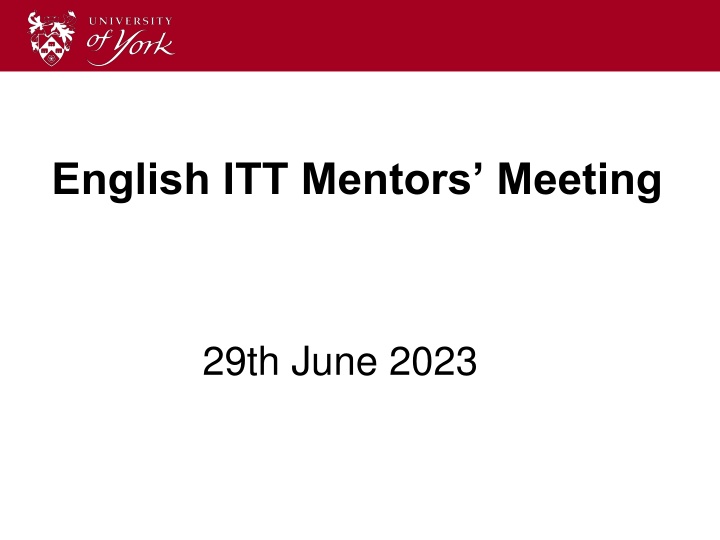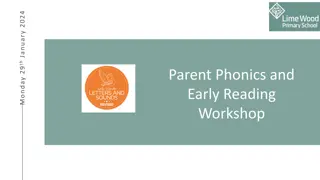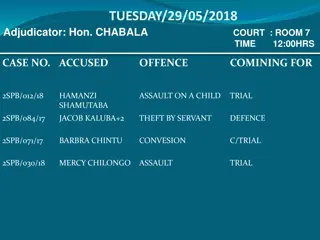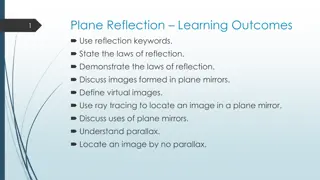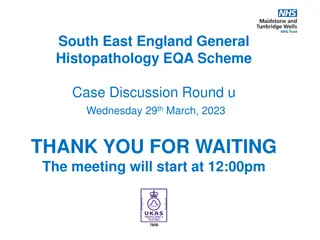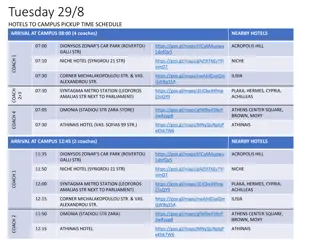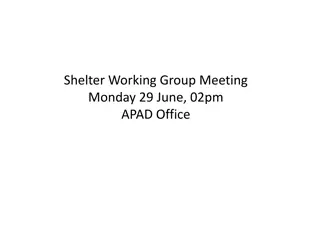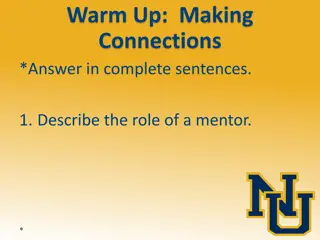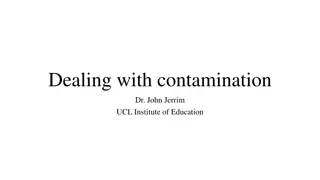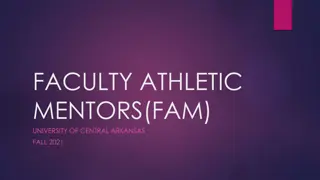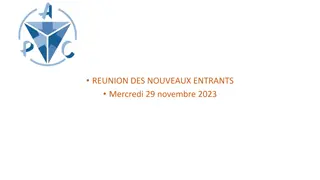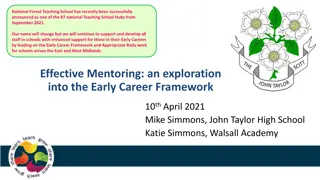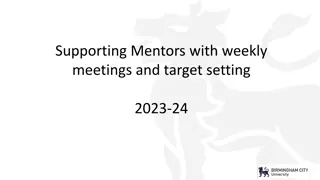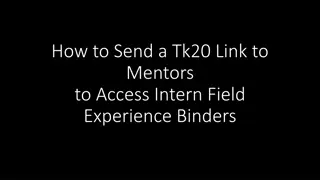English ITT Mentors Meeting on 29th June 2023 Review & Reflection
The English ITT Mentors Meeting held on the 29th of June, 2023 covered a review of the year, completion rates of the 2022-23 English cohort, first posts of trainees, in-year changes to the training program supporting EAL pupils, and reflections from an English trainee on the challenges and growth experienced during the PGCE year. The meeting discussed highlights, challenges, university training connections, and pedagogical readings used in mentoring.
Download Presentation

Please find below an Image/Link to download the presentation.
The content on the website is provided AS IS for your information and personal use only. It may not be sold, licensed, or shared on other websites without obtaining consent from the author.If you encounter any issues during the download, it is possible that the publisher has removed the file from their server.
You are allowed to download the files provided on this website for personal or commercial use, subject to the condition that they are used lawfully. All files are the property of their respective owners.
The content on the website is provided AS IS for your information and personal use only. It may not be sold, licensed, or shared on other websites without obtaining consent from the author.
E N D
Presentation Transcript
English ITT Mentors Meeting 29th June 2023
Item 2: Completion rates 2022-23 English Cohort: Number starting the course: 17 Number taking leave of absence: 0 Number withdrawn from the course: 0 Number who have passed the course: 17
Item 2: First posts 14/17 employed from Sept. as ECTs: 1 - York 1 - Leeds 2 - Wakefield 3- North Yorks 2- East Yorks 1 Hull 1 - Liverpool 1 - Oxford 1 London 1 Devon Others: 1 has secured a job teaching in China for a year 1 is taking a gap year and travelling, but plans to start ECT Year 1 in September 2024 1 is still looking for employment but wanting to teach ideally for the next two years in an international school in Europe N.B. Financial support over Summer and across September for this cohort?
Item 2: In Year Changes to the Training Programme Supporting & challenging EAL Pupils in English Increased focus on: Post 16 English Language & English Literature Creativity in English Teaching Handouts: Gilbert, F. (2022) The Reciprocal Rebellion: Promoting Discussion in Authoritarian Schools, Changing English, 29:3, 232-250 Smith, L. (2019) We re Not Building Worker Bees. What Has Happened to Creative Practice in England Since the Dartmouth Conference of 1966?, Changing English, 26:1, 48-62,
Item 2 Training UoY English Trainees in 2022-2023 How was it for you? e.g. Highlights? Challenges you faced as mentors? (and solutions you found?) What explicit connections to any university based training did you make, how did you do this and how did this go? How did you use pedagogical reading (i.e. the Barbara Bleiman book and any other reading) as part of your mentoring?
Item 2 Reflections of an English Trainee on this Year It has been a long year. Everyone told me the PGCE was intense, but it s hard to understand this without going through it. Navigating the plethora of commitments to schools, the university, and friends and family, is overwhelming. Waking up and facing a new challenge every day quickly becomes exhausting. Crucially, the course causes you to question who you are and what you want for yourself there is no way to encapsulate the fraught experience of adjusting to the change of character that occurs during the PGCE year. Despite questioning whether the career was for me, there was always something that made me stay on the course. Fortunately, I was placed in two schools with supportive departments and fantastic mentors, alongside phenomenal guidance and support from staff at the university when faced with challenges, I had a wealth of wisdom and kindness to draw upon. I also met a great group of fellow trainees, who I am glad to call friends. But it was only when returning to my second placement for professional enrichment that I realised what kept me going during the year; the students who I taught were genuinely happy to see me return. I understood, then, that I had done something positive for these young people, and in that, had embarked on a career I could not easily give up. Because, while it is difficult to express the challenges of the year, it is equally hard to express how much I have gained. I am a far more resilient person, and far more confident than I was. I have gained a lot of good memories, of triumphant lessons, of conversations with students, of long and good days. I came away from both placement schools knowing, I ll miss this place. To future trainees: know the students it both helps with classroom management and is far more rewarding. Embrace imperfection you cannot please everyone, so do all you can, and move on. Remember you are a human being before you are a teacher. Lastly, make a note of when it feels worth it. It s easy to forget, amidst the intensity of the year, but those moments will keep you going during the course and will stay with you long afterwards.
Item 3 Introducing ITaP
Item 3 ITaP = Intensive Training and Practice Requirement for 2024-25 ITT delivery 4 ITaP weeks ITaP weeks must have a minimum of 25 hours of structured time, including 5 hours of expert input Some ITaP time must be spent in schools Our intention is to pilot an ITaP week (ITaP 2) in 2023-24 (January 2024) School Professional Tutors are already aware and on board
Item 3 Building positive relationships which set high expectations ITaP CCF Overview Mid October CCF 1 CCF7 Beginning of Placement 1 Block 1 Building positive relationships which set high expectations ITaP 1 Early January CCF 2 CCF4 Beginning of Placement 1 Block 2 Supporting Progression through Effective Planning ITaP 2 Mid February CCF 3 CCF 6 End of Placement 1 Block 2 Accurate and Productive use of Assessment ITaP 3 Early April End of Placement 2 Block 1 Adaptive and Responsive Teaching ITaP 4 CCF 5 CCF 8
Item 3 ITaP 2: Supporting Progression through Effective Planning Brief ITaP Week Summary Key areas of CCF 2.1. Learning involves a lasting change in pupils capabilities or understanding. 2.6. Where prior knowledge is weak, pupils are more likely to develop misconceptions, particularly if new ideas are introduced too quickly. 2.9. Worked examples that take pupils through each step of a new process are also likely to support pupils to learn. 4.2. Effective teachers introduce new material in steps, explicitly linking new ideas to what has been previously studied and learned. 4.3. Modelling helps pupils understand new processes and ideas; good models make abstract ideas concrete and accessible. 4.4. Guides, scaffolds and worked examples can help pupils apply new ideas, but should be gradually removed as pupil expertise increases. 4.5. Explicitly teaching pupils metacognitive strategies linked to subject knowledge, including how to plan, monitor and evaluate, supports independence and academic success. The key focus of this week is for trainees to further develop their use of explicit instructions and explanations, through the use of careful modelling and worked examples, appropriate metacognitive strategies, alongside planning for tackling misconceptions within lessons. The trainees will use this development to plan across a sequence of lessons, as they move beyond planning and delivering lessons as a somewhat isolated event. Preparation for Assignment 2
Item 3 Monday (8/1/24) University/ SD Hub Activate Tuesday (9/1/24) Placement School Observe Wednesday (10/1/24) University Practise Thursday (11/1/24) Placement School Friday (12/1/24) University Apply Refine
Item 4 OfSTED Update Link to Current Ofsted Inspection Framework for ITE
Item 4 Item 5 Ofsted Intent 170. In evaluating the ITE provider s intent, inspectors will primarily consider the curriculum provided by the ITE provider. They will discuss this with the provider s representatives, leaders and managers. Inspectors must ensure that the curriculum provided prepares trainees to meet the relevant professional standards (QTS or EYTS). In primary and secondary phases, ITE inspectors must ensure that providers produce the minimum entitlement outlined in the ITT core content framework. Implementation 171. In evaluating the implementation of the ITE curriculum, inspectors will primarily consider how trainees are taught, trained and supported at both the centre and on placements, including the quality of mentoring. Impact 176. When inspectors evaluate the impact of the education and training offered by the provider, their focus will primarily be on whether trainees know more and remember more of the intended curriculum and apply that knowledge to their practice.
Item 4 Item 5 Ofsted 41. A provider s ITE curriculum sets out the aims of a teacher-training programme, covering both centre- and placement-based training. It also sets out the structure within which those aims should be implemented, including the knowledge, skills and behaviours to be gained at each stage. It enables the evaluation of trainees knowledge and skills against those expectations. 104. The framework seeks to put a single, joined-up conversation about education at the heart of inspection. It is built around the connectedness of the trainee curriculum, training on pedagogical approaches and assessment of trainees within the quality of education and training judgement. 115. Inspectors will use meetings with mentors to consider how the training and support they provide for trainees is part of a subject- and phase-specific curriculum that is purposefully integrated (where applicable) across the centre- and placement- based settings. This conversation will allow inspectors to consider the role of mentors within the provider and whether the mentors agreed role allows them to provide trainees with the training and support they need.
Item 5 An Ideal Key Stage 3 English Curriculum? Your group task is to begin designing a long- term curriculum plan for Key Stage 3 English showing what ideally you feel should be taught (knowledge & skills) and how you would sequence this learning so that you end up with something coherent that lays a strong foundation for GCSE success in Language & Literature. Link to Folder of Trainees Work
Item 6: Recruitment Current Accepts for English is: 24 York: 16 Pathfinder: 4 DMTSA: 4 N.B. We have one person holding 2 offers currently so the group may end up as 25. Applications for English are now CLOSED! N.B. 15,000 training bursary for English this coming year. 86 in the entire cohort so far (It was 72 this same time last year)!
